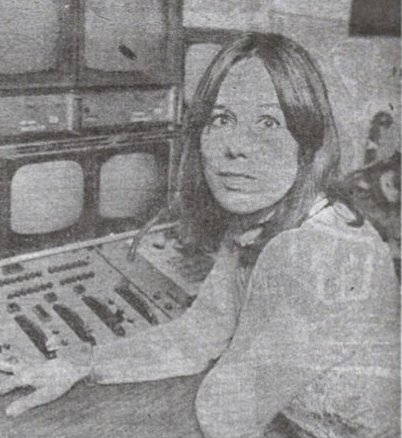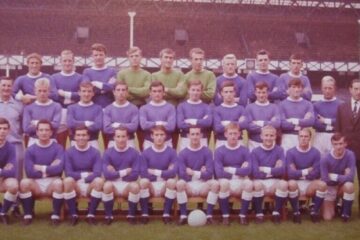Kick Off – The First Lady of Football on Television
In the north west of England, there was a Friday night football programme through out the seventies called ‘Kick Off’, featuring all of the north west clubs in the four divisions of the Football League. The emphasis would be on the big games that were being played that weekend featuring the region’s clubs. Interviews with players, managers, including action of the region’s teams from the week before, would feature in the thirty-minute show. The presenter was Gerald Sinstadt who joined Granada in 1969/70 until 1980-81.
Two days later, a regular Sunday afternoon show called ‘The Kick Off Match’, was televised, which featured the big game from the region, with a catchy introductory signature tune called ‘Looking High.’

Then in 1977 came an important development for the role of women in television. Patricia Pearson was the first female director to cover a football match for a major broadcaster. Patricia, as she prefers to be known – due to the fact she would be recognised as a woman when the credits scrolled down the screen, had been working for Granada TV for a year or so, directing numerous regional programmes such as Granada Reports.
John Huntley, the usual director of ‘Kick Off’ was unavailable due to sickness, which led Granada to ask Patricia if she could stand in, as she was already accustomed to the surroundings of the studio and the set up, which in turn led her being asked to direct the Kick Off match aired on a Sunday afternoon. Her appointment turned a few turned heads at the time, as this was a TV first to see a woman directing such a high profile football match on a Sunday afternoon.
As a youngster, Patricia was a regular visitor with her father to Griffin Park, Brentford, and Hayes and Harlington in the non-league. Her knowledge and interest in football proved to be advantageous at Granada, which was cleary instumental combined with her skills in the studio that led to head of sport Paul Docherty handing her the opportunity to direct The Kick Off Match.

Patricia’s debut as a football TV director was Bolton Wanderers versus Southampton on 16 April 1977 which went successfully. She would be situated in vehicle for the outside broadcast on the adjacent stadium car park, with a PA who would be timing everything, and Paul Docherty as producer, who would be instigating which players to interview at the end of the game. Patricia would be scrutinising all of the TV monitors, then instructing the cameramen as to what shots to show. In a similar fashion to other regional broadcasts, a half-time report also had to be sent to the World of Sport national programme. Another aspect of her role was to give the cameramen a squad photo where she would ask them to identify a player should she want a close up of them, unlike todays game where players are easier to recognise having their name on the back of their shirt.
There were three cameras used in the matches, one camera that would take all of the wide shot action, a camera on the near touch line which would take in the images of close-up play, with another camera installed in a high position which would capture close ups on the opposite side. The trick of the trade was knowing when to cut one shot from the other. She also oversee when to put the slow-motion action the edit afterwards.
As well as trying to find her feet in a demanding position, it had to be done in an atmosphere of misogyny, where this was still viewed as a men-only sport and environment. The male producers of the programme would be invited into the boardroom with the directors of the football club to share a glass of alcohol, where Patricia, the most senior of the production team, would be invited into a lady’s room to talk with director’s wives over a cup of tea, a situation that continued for a while longer. Attitudes which would no doubt shock women in football today.

Patricia’s name on the programme’s credits were at last beginning to get noticed as chairmen of football clubs came to terms with a woman involved. She then became Granada’s chief football director, which was some achievement given the attitudes of the time.
Another example of eighties sexism was when the Milk Cup Final in 1984 between Everton and Liverpool was replayed at Maine Road (Manchester) after a goalless draw at Wembley. Manchester of course was Granada territory. Controllers of ITV Sport were horrified when Granada director David Plowright insisted that Patricia was going to be at the helm, resulting in a mountain of phone calls. Plowwright held firm and the day after the game Patricia role was highly praised, bringing phone call of a different nature and a telegram congratulating her for the way she conducted the role.
To add to this, back in the day when the League Cup Final highlights were shown on a Sunday afternoon, the PFA held their awards dinner that very same night. Until then, a woman had never been invited to such an event, as this was exclusively male society. Football directors from regionalised TV companies were invited, which prompted Paul Docherty to inform his superiors that Patricia must also attend the dinner. To this day, she is the only female to have been invited to the dinner.
Twelve months later when the event arose once more, ITV told Patricia that it caused a ‘lot of inconvenience’ to invite her to such an occasion. She told them that she wasn’t really bothered about going again, as she had already done it, an achievement she remains proud of.
Patricia doesn’t hold any particular memories of any Goodison games having been there so many times. She does recall a derby game as both sets of fans sharing car parks with the promise from youngsters wanting to mind the cars hoping for a ‘bob’ or two. The tradition of the toffee lady is also another memory she holds, admiring the tradition which continues. As far as players go, she does remember Howard Kendall and Bob Latchford.
Patricia’s wealth of experience took her to a bigger stage working for TV in two World Cup finals, one in 1982 in Spain, and the following tournament four years later in Mexico.
Her success in the business brought more women to the forefront of television, and she is is pround to have set a precedent for other to follow. She ended her association with Granada in the late 1980’s, going freelance, before establishing herself with another Manchester based company Action Time, covering entertainment for children.




